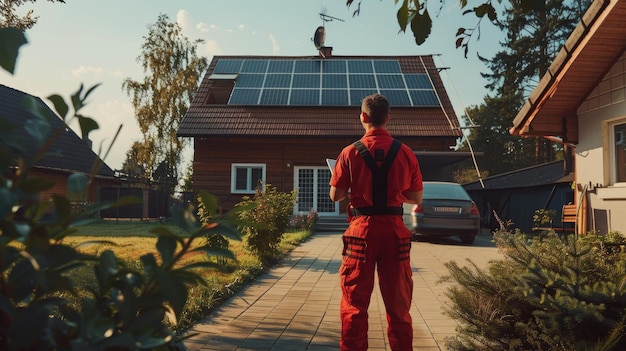Making your home energy-efficient is not just about saving money on your bills. It’s about making small changes that have a big impact on the environment too. If you’re looking for practical ways to cut down on energy use, you’re in the right place. In this guide, we’ll explore easy, effective steps to help you create an energy-efficient home that you can feel good about.
And if you’re thinking about switching energy providers, you might want to consider energyaustralia for affordable and sustainable options. Let’s dive into the different ways to boost your home’s energy efficiency.
Understanding the Importance of Energy Efficiency
Energy efficiency means using less energy to perform the same tasks, like heating, cooling, and lighting your home. It’s not just a buzzword. It’s a practical approach that helps you save money while reducing your carbon footprint.
When you make your home more energy-efficient, you’ll notice lower energy bills, increased comfort, and a more environmentally friendly space. Plus, it can raise the value of your home in the long run. So, why not start today?
Seal Up Any Air Leaks
A drafty home is one of the biggest causes of wasted energy. Air leaks allow heated or cooled air to escape, which makes your HVAC system work harder. It’s time to plug those leaks.
Check around doors and windows for gaps. You can feel a draft or see daylight peeking through. Seal these spots with weatherstripping or caulk. Don’t forget to check areas like your attic, where leaks can go unnoticed. By sealing leaks, you’ll make your home more energy-efficient and comfortable.
Quick Fixes to Seal Air Leaks:
- Use caulk to seal gaps around windows.
- Add weatherstripping to doors.
- Check your attic for hidden leaks.
Upgrade to Energy-Efficient Windows
If your home has older windows, they might not be as energy-efficient as newer models. Modern, energy-efficient windows are designed to keep heat in during the winter and out during the summer. This means your home stays comfortable without overworking your heating or cooling system.

Double-pane windows with low-E glass are a great investment. They can help reduce energy costs and keep your home comfortable year-round. If new windows aren’t in your budget, consider using window films or coverings to block out excess heat.
Adjust Your Thermostat
Adjusting your thermostat even by a few degrees can make a big difference in your energy usage. In the winter, lower your thermostat by a couple of degrees. In the summer, raise it slightly to reduce the strain on your air conditioning.
Programmable thermostats are another fantastic tool. They let you set the temperature to automatically adjust when you’re not home, so you’re not wasting energy on heating or cooling an empty house.
Switch to LED Lighting
One of the easiest and most affordable ways to improve your home’s energy efficiency is by switching to LED bulbs. They use significantly less energy than traditional incandescent bulbs and last much longer too.
You can start by replacing the lights in the rooms you use the most. LED bulbs are available in a variety of styles, so you can find something that suits your home’s aesthetic while saving energy.
Benefits of LED Bulbs:
- Use up to 75% less energy than incandescent bulbs.
- Last 25 times longer than traditional lighting.
- Available in a wide range of styles and colors.
Insulate Your Home Properly
Proper insulation is key to an energy-efficient home. It keeps the warm air in during winter and the cool air in during summer. Many homes, especially older ones, are under-insulated, which leads to energy waste.
Check your attic, walls, and floors to see if more insulation is needed. Adding insulation can make a big difference in your comfort and your energy bills. Even small upgrades like insulating your water heater can save you money.
Simple Insulation Tips:
- Add insulation to your attic and walls.
- Insulate your water heater and hot water pipes.
- Use draft stoppers under doors to prevent heat loss.
Upgrade to Energy-Efficient Appliances
If your appliances are more than a decade old, it might be time for an upgrade. Newer appliances are designed to use less energy while delivering better performance. Look for Energy Star-rated appliances, which meet strict efficiency guidelines.
Refrigerators, dishwashers, and washing machines are some of the biggest energy users in your home. Replacing them with energy-efficient models can significantly reduce your overall energy consumption.
And, if you’re planning a move, origin energy moving services can help you ensure your new home is set up for efficiency right from the start.
Install a Smart Power Strip
Did you know that even when electronics are turned off, they can still use energy? It’s called phantom power, and it can add up over time. A smart power strip can help.
These strips automatically cut off power to devices when they’re not in use. It’s a small, affordable investment that helps you save energy without thinking about it.
Use Energy-Efficient Water Fixtures
Reducing the amount of water you use can also help cut down your energy usage. Energy-efficient showerheads and faucets are designed to use less water without sacrificing water pressure. This means you’ll save on both your water and energy bills.
Consider installing a low-flow showerhead or faucet aerator to reduce water consumption. They’re easy to install and can make a noticeable difference in your utility costs.
Energy-Saving Water Fixture Ideas:
- Install low-flow showerheads.
- Use faucet aerators to reduce water use.
- Fix any leaky faucets or pipes to avoid water waste.
Consider Solar Panels
If you’re ready to take your home’s energy efficiency to the next level, solar panels are a fantastic option. They allow you to generate your own electricity from a renewable source, reducing your reliance on traditional energy providers.

Solar panels can be an investment, but over time, they can help you save a significant amount on your energy bills. Plus, many governments offer incentives and tax credits for homeowners who install solar panels.
Benefits of Solar Panels:
- Generate your own electricity from the sun.
- Lower your reliance on traditional energy sources.
- Potentially earn credits for excess energy produced.
Use Natural Light
Maximizing natural light in your home is a simple way to save energy. Open your curtains and blinds during the day to let sunlight fill your space. This reduces your need for artificial lighting and can help warm your home during the winter months.
Consider adding skylights or larger windows if your home doesn’t get much natural light. It’s a natural, energy-saving solution that makes your home feel brighter and more welcoming.
Natural Light Tips:
- Keep curtains and blinds open during the day.
- Use light-colored paint to reflect more light.
- Add skylights to dark rooms for extra sunlight.
Final Thoughts on Improving Energy Efficiency
Making your home more energy-efficient doesn’t have to be overwhelming. With just a few simple changes, you can reduce your energy usage, save money, and create a more comfortable living space. Whether it’s sealing air leaks, upgrading appliances, or maximizing natural light, every step you take brings you closer to an energy-efficient home.
It’s not only good for your wallet, but it’s also great for the environment. Start with one or two projects today, and before you know it, you’ll have a home that’s efficient, comfortable, and eco-friendly.



